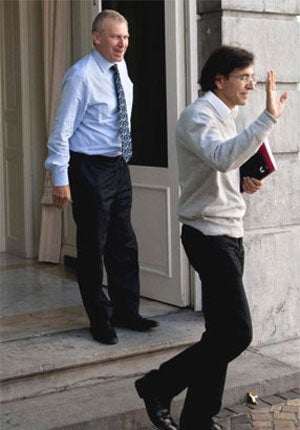Belgium finally set to end world's longest ever political limbo
There is a new sense of urgency because the caretaker Prime Minister is retiring from politics. This may force an election which could break up the country

After a world record-breaking 15 months without an elected government, Belgium appeared yesterday to be teetering on the edge of a compromise between its Dutch-speaking and francophone political parties.
Although no coalition government has yet been agreed, eight parties have solved a conundrum which has defied Belgian politicians for almost half a century: how to guarantee the civic rights of French-speaking people who live in the officially Dutch-speaking suburbs of Brussels.
As negotiations continued on other issues yesterday, there were cautious hopes that a new coalition could take office before the end of this month or at least before the end of October. The leader of the francophone Socialist party, Elio Di Rupo, the latest of a long line of politicians who have struggled to form a government since the last elections in June 2010, warned: "The work is far from done and there are still many issues to discuss." Other political leaders said they had "crossed a difficult bridge" and "removed an important stumbling block".
Two factors have introduced a sense of urgency into the interminable talks in recent days. The Flemish Christian Democrat caretaker Prime Minister, Yves Leterme, announced last week that he was retiring from Belgian politics to take a senior job at the OECD. Without him, Belgium might be pushed into new elections that could deliver an even higher vote for Flemish nationalist parties in the north and threaten to break up the country.
Second, international ratings agencies have been complaining about the lack of a coherent national plan to reduce Belgium's accumulated debt, which now amounts to 96 per cent of GDP. Others point out that, without a proper national government, Belgium has been spending less and its annual deficit has been shrinking.
For many months, the negotiations – the longest coalition talks in world history – foundered on the demands of a new "moderate" Flemish nationalist party, the NVA, which headed the poll in the prosperous north of the country in June last year. The party's leader, Bart De Wever, who insists on extensive new devolved powers for Flanders, was excluded from the talks earlier this year.
After the June 2010 results, it would be just about possible to form a Belgian federal government without the NVA. That might no longer be possible after fresh elections. Mr de Wever is now credited with more than 40 per cent support among the six million Dutch-speaking Belgians.
Late-night talks between eight French and Dutch-speaking parties on Tuesday provisionally solved several problems which have cursed Belgian politics for decades. Brussels, a mostly francophone city within Flanders, would be given an enhanced status as a "third" region of Belgium.
The upper house of the Belgian parliament, the Senate, would become a kind of "assembly of the regions" – potentially bridging the gulf which has been created by successive waves of devolution between Dutch and French-speaking politicians and communities.
Most important of all, the eight parties agreed a compromise on the vexed question of voting and civic rights for French-speakers who live in the officially Dutch-speaking ring of suburbs around the capital. At present, the entire region counts as one parliamentary constituency, Brussels- Hal-Vilvorde, in which both Flemish and Francophone parties compete for votes.
In future, Brussels would become a separate bi-lingual constituency; the suburbs would only vote for Flemish parties; but French-speakers in the most heavily francophone suburbs would be allowed to vote within the city. Their rights to receive some local services in French would also be maintained.
Talks on economic and social questions are continuing. The hope is that a government will be formed in the next few weeks and, if possible, before the 500th day of negotiations in late October.
Join our commenting forum
Join thought-provoking conversations, follow other Independent readers and see their replies
Comments
Bookmark popover
Removed from bookmarks